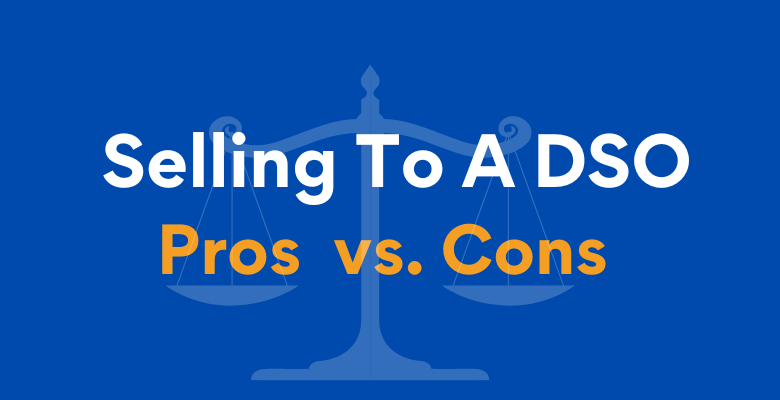
Is Selling To A DSO A Good Idea? The Pros And Cons To Consider
The dental industry has experienced significant changes over the past few years, with one of the most notable shifts being the rise of Dental Support Organizations (DSO's). As a successful dental practice owner, you may have wondered whether selling your practice to a DSO is a good idea or not. In this article, we'll explore the pros and cons of selling to a DSO to help you make an informed decision.
What Is A DSO?
A DSO is a Dental Support Organization, which provides administrative and management services to dental practices. DSO's support multiple practices under a single umbrella, allowing dentists to focus on clinical aspects while the DSO has the capability to handle many of the back-office and business side of running a practice. DSO's vary greatly in size and structure, ranging from local, regional entities to large national corporations.
Pros Of Selling To A DSO:
#1 Financial Benefits
Selling your dental practice to a DSO can result in an attractive financial payout. In the majority of cases, a DSO sale or partnership will net the owner a much greater valuation than can be obtained in a private sale. We are currently seeing historically unseen multiples and valuations offered to succesful dental practice owners considering a DSO Sale or Partnership.
DSO's typically pay a premium for established practices with a strong patient base and a positive reputation in the community. This can be an appealing option if you're exit planning and nearing retirement or looking to take a step back from managing your practice.
#2 Economies Of Scale
DSO's can leverage their size to negotiate better deals with suppliers, reduce overhead costs, and implement more efficient systems. They can help implement best practices learned from their network of practices under management. Implementation of these best practices with reduced costs can lead to improved profitability for the dental practice.
#3 Access To Resources
DSO's have the financial and operational resources to invest in advanced technology, marketing, and staff recruitment and training. This can help your practice stay competitive in a rapidly changing industry. The best DSO groups will host doctor meet ups and training sessions throughout the year to help their affiliated dentists grow their knowledge in all areas of dentistry.
#4 Focus On Patient Care
By selling to a DSO, dentists can shift their focus from overwhelming administrative tasks to providing quality patient care. DSO's can handle much of the business side of the practice, allowing dentists to spend more time on clinical and chair side efforts.
Potential Cons Of Selling To A DSO:
#1 Long-Term Employment Commitment
When you sell your practice to a DSO, you're often required to sign a long-term contract that includes employment terms, non-compete clauses, and other restrictions. This may limit your future professional options. One of the reasons that a DSO will pay a much higher valuation than a private sale is that they are counting on a future revenue stream. In order for them to reduce the overall risk of such a transaction, they will typically ask the selling dentist to stay on for a period of 3 to 5 years. It is possible to negotiate a shorter commitment term, but will typically come at a reduction in valuation due to the increased risk of the transition.
#2 Potential Loss Of Control
Each DSO is structured differently and expect varying levels of involvement. Depending on the DSO you sell your practice to, there is a chance that you will lose some degree of control over the day-to-day operations. This may include changes in policies, staffing, or even the overall direction of the practice.
Although some dentists prefer less involvement post sale, for others this loss of control can be difficult to accept. It is important to have in-depth discussions when you are entertaining a DSO affiliation to determine if the group is the right fit for you and your practice.
#3 Potential Change In Culture
Some DSO's have a more corporate culture focus compared to private practices, with an emphasis on standardization and efficiency. While this can lead to a more profitable and efficient practice, some sellers may have an issue accepting these suggestions. However, there are many DSO's offer complete clinical autonomy that your staff and patients wail appreciate in their dental care. It is important to understand the culture of the DSO you are considering and determine if it is a good fit for your practice.
#4 Potential Re-branding
Some DSO's are branded, meaning they will eventually change the name of your practice to the corporate brand. While some dentists may be OK with a name change, others may have issues with losing the name and goodwill they have built in the community over the years. However, there are also DSO's that operate in the background and are invisible to the patients and the public. It is important to weigh the differences when considering a DSO sale or partnership.
In Conclusion:
The decision to sell your dental practice to a DSO is a complex one, requiring careful consideration of the pros and cons. While selling to a DSO can offer financial benefits, access to resources, and the opportunity to focus on patient care, it also involves a loss of control, potential changes in practice culture, and contractual obligations. It's essential to weigh these factors against your individual goals and values to determine if selling to a DSO is the right choice for you and your practice.
Selling to a DSO on your own can be a complicated task. A knowledgeable and experienced DSO Sales Advisor like 1st Med Transitions can take the weight of the sale off your shoulders and add value to the process. With expert analysis, direction and increased competition, you will maximize your market value. Just as your patients benefit from the value that a qualified, experienced and knowledgeable doctor brings to the table, you can benefit from the services of a qualified and experienced DSO sales advisor with specific expertise in Dental Mergers and Acquisitions.

Michael S. Furlong - Senior Transitions Officer
Mike specializes in DSO Transitions and Large Practice Sales and has been working directlt with Dentists for over 15 Years. He has personally been involved in $554 Million in closed practice transactions. Mike can be reached at(800) 815-0590 x201 or mfurlong@1stmedtransitions.com.
Speak With A DSO Sales Expert
Why Sell With 1st Med?
- DSO Transition Experts
- Free EBITDA Analysis
- Fair Commission Structure
- Get 6x to 10x Multiples
- 100+ DSO/Private Groups NW
Our Featured Articles
-
by: Michael S. Furlong Is Selling To A DSO A Good Idea?
Is Selling To A DSO A Good Idea? -
by: Michael S. Furlong Why Is EBITDA Important To A DSO?
Why Is EBITDA Important To A DSO? -
by: Michael S. Furlong Why You Should Use A Dental Broker When Selling To A DSO?
Why You Should Use A Dental Broker When Selling To A DSO? -
by: Michael S. Furlong 10 Tips When Thinking Of Selling!
10 Tips When Thinking Of Selling! -
by: Michael S. Furlong Ready To Sell... Read This First!
>> Read More
Ready To Sell... Read This First!
>> Read More